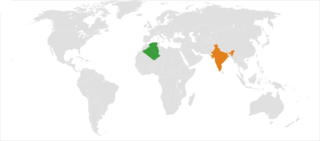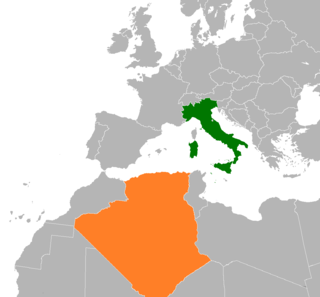
Since its independence from France in 1962, Algeria has pursued an activist foreign policy. In the 1960s and 1970s, Algeria was noted for its support of Third World policies and independence movements. Since its independence, Algeria has been a member of the Arab League, the African Union and of the United Nations.

The Interests Section of the Islamic Republic of Iran in the United States is a part of the Pakistani Embassy in Washington, D.C., and is the de facto consular representation of the Islamic Republic of Iran in the United States.
The Algiers Accords of January 19, 1981 was a set of obligations and commitments undertaken independently by the United States and Iran to resolve the Iran hostage crisis, brokered by the Algerian government and signed in Algiers on January 19, 1981. The crisis began from the takeover of the American embassy in Tehran on November 4, 1979, where Iranian students took hostage of present American embassy staff. By this accord and its adherence, 52 American citizens were able to leave Iran. With the two countries unable to settle on mutually agreeable terms, particularly for quantitative financial obligations, Algerian mediators proposed an alternative agreement model - one where each country undertook obligations under the accords independently, rather than requiring both countries to mutually adhere to the same terms under a bilateral agreement.

In July 2001, President Abdelaziz Bouteflika became the first Algerian President to visit the White House since 1985. This visit, followed by a second meeting in November 2001, and President Bouteflika's participation at the June 2004 G8 Sea Island Summit, is indicative of the growing relationship between the United States and Algeria. Since the September 11 attacks in the United States, contacts in key areas of mutual concern, including law enforcement and counter-terrorism cooperation, have intensified. Algeria publicly condemned the terrorist attacks on the United States and has been strongly supportive of the international war on terrorism. The United States and Algeria consult closely on key international and regional issues. The pace and scope of senior-level visits has accelerated.

Russia has an embassy in Algiers and a consulate in Annaba, and Algeria has an embassy in Moscow. Algeria currently enjoys very strong relations with Russia. The Russian embassy is located in Algiers and the Algerian embassy is located in Moscow.

Relations between France and Algeria span more than five centuries. This large amount of time has led to many changes within the nation of Algeria; subsequently, affecting the relations enormously. Through this time period, Algeria has gone through being part of the Ottoman Empire, being conquered and colonized by France, playing an important role in both world wars, and finally being its own nation. Over time, relations between the nations have suffered, as tension between Algerians and the French have increased.

Algeria is represented in Morocco by a consulate general in Rabat, and two consulates in Casablanca and Oujda. Morocco is represented in Algeria by an embassy and consulate general in Algiers, as well as two consulates in Oran and Sidi Bel Abbès. Relations between the two North African states have been marred by several crises since their independence, particularly the 1963 Sand War, the Western Sahara War of 1975–1991, the closing of the Algeria–Morocco border in 1994, an ongoing disagreement over the political status of Western Sahara and the signing of the Israel–Morocco normalization agreement in 2020.

Algeria and the Tunisia are both predominantly Muslim nations in North Africa. Both countries have historic dynasties primarily focused in Algiers and Tunis that became specialized in piracy and global trade. Eventually these dynasties fell under the influence of the French in the 19th century. Both remained under French control until Tunisian independence became official in 1956 and Algeria became independent after the conclusion of the Algerian War in 1962. Since independence both countries have had periods of antagonism over issues such as border security and terrorism, however it appears that both countries are trending towards a positive relationship. The Algerian-Tunisian border is around 1034 km (642 mi) long and was officially agreed upon in 1960. Both countries are members of the African Union, Arab League, Organisation of Islamic Cooperation, Union for the Mediterranean and the United Nations.

Diplomatic relations between Algeria and Greece date back for more than 2000 years. Diplomatic relations have been solid since Algeria's first years of independence. Greece maintains an embassy in Algiers, and Algeria is represented in Greece by its embassy in Athens. Trade between Greece and Algeria is increasing, with imports of natural gas from Algeria an important factor. There have been problems with illegal immigration from Algeria to Greece in recent years, and with Algerian trafficking of Sub-Saharan Africans seeking to enter the European Union.

Algeria and China have traditionally strong relations, celebrating the 60th anniversary of the establishment of diplomatic relations in 2018. In 2010, relations were considered the strongest of all Arab-Chinese relations behind Sudanese-Chinese relations. While relations are firmly grounded in commercial ties, diplomatic relations have notably extended into socio-cultural and political spheres.

Algeria and India maintain diplomatic relations. Algeria has an embassy in New Delhi, and India has an embassy in Algiers.

Algeria and Indonesia established diplomatic relations in 1963. The relationship is mostly founded on common religious and anti-colonialism solidarity, as Indonesia and Algeria are Muslim-majority countries that also once fell under colonialism. Algeria recognized Indonesia's role on supporting their country on gaining independence in 1962. Both countries agreed on expanding cooperations and strengthening relations. Algeria has an embassy in Jakarta that also accredited to Singapore and Brunei, while Indonesia has an embassy in Algiers. Both nations are members of the Non-Aligned Movement, Group of 77 and Organisation of Islamic Cooperation (OIC).

The Iran hostage crisis negotiations were negotiations in 1980 and 1981 between the United States Government and the Iranian Government to end the Iranian hostage crisis. The 52 American hostages, seized from the US Embassy in Tehran in November 1979, were finally released on 20 January 1981. A detailed account of the hostage crisis and the Algiers Accords is found in American Hostages In Iran: The Conduct of a Crisis [Yale 1985] put together by the Council on Foreign Relations.

Algeria–Mexico relations are the diplomatic relations between the People's Democratic Republic of Algeria and the United Mexican States. Both Algeria and Mexico are members of the Group of 15, Group of 24 and the United Nations.

Algeria and Vietnam established relations in 1962, although the link between Algeria and Vietnam has been recorded much longer than modern history. Algeria has an embassy in Hanoi while Vietnam has an embassy in Algiers.

Algeria and Italy have a connection. Northern part of Algeria's today was formerly territory of the Roman Empire which was originally from modern-day Italy, some historical sites like the Djémila and Tipasa, two ancient Roman heritages that are now UNESCO World Heritage Sites. Due to historical legacies, Italy and Algeria's relations is viewed as important for stability in the region.

Algeria and Poland are members of the Union for the Mediterranean and the United Nations. Both nations established diplomatic relations in 1962.

Algeria–Brazil relations are the bilateral relations between Algeria and Brazil. The two countries are members of the Group of 15, Group of 24, Group of 77 and the United Nations.

Relations between Germany and Algeria are described as "good" by the German Federal Foreign Office. Germany is among Algeria's most important trading partners. The two countries concluded an energy partnership in 2015.



















